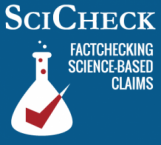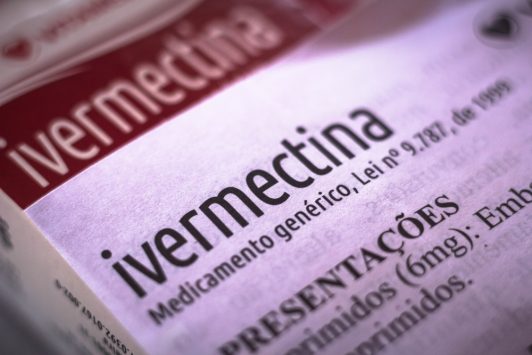SciCheck Digest
A Japanese company found that the antiparasitic drug ivermectin showed an “antiviral effect” against the omicron variant in a lab setting. Reuters has corrected a story in which it “misstated” that the drug was effective in a phase 3 clinical trial with human subjects. Some social media users have repeated Reuters’ reporting error but have not repeated the correction.
Full Story
Kowa Company Ltd., a Japanese trading and pharmaceuticals company, announced Jan. 31 that the antiparasitic drug ivermectin showed an “antiviral effect” against the omicron variant of SARS-CoV-2 in “joint non-clinical research,” according to a corrected Reuters news story.
 In the original version of its article, however, the news organization inaccurately reported that the drug was confirmed to be effective against the coronavirus that causes COVID-19 in advanced clinical trials with human test subjects.
In the original version of its article, however, the news organization inaccurately reported that the drug was confirmed to be effective against the coronavirus that causes COVID-19 in advanced clinical trials with human test subjects.
“The original Reuters story misstated that ivermectin was ‘effective’ against Omicron in Phase III clinical trials, which are conducted in humans,” a Reuters spokesperson said in a statement to FactCheck.org, echoing the correction Reuters added to its story early on Jan. 31. “We corrected this to clarify it [ivermectin] had an ‘antiviral effect’ against Omicron and it was shown in joint nonclinical research. After being made aware of the error, we corrected our story immediately.”
The distinction is vital because ivermectin had already been shown to have an antiviral effect in the lab in petri dishes, or “non-clinical research.” That means the Japanese findings are not surprising. But clinical trials involving humans are still ongoing and haven’t answered whether the drug is effective in treating COVID-19.
How did the Reuters reporting mistake happen?
“We misinterpreted the Kowa announcement and corrected our story promptly to accurately reflect what the company said with the appropriate context,” a Reuters spokesperson told Erik Wemple of the Washington Post.
But some people who repeated Reuters’ error on social media have yet to issue the same correction.
“Japan’s Kowa says ivermectin has proven effective in Phase 3 trials,” conservative commentator Charlie Kirk, who has 1.7 million followers on Twitter, said in a Jan. 31 tweet that has not been deleted, for example.
Japan's Kowa says ivermectin has proven effective in Phase 3 trials.
Years from now, the media will realize how wrong they were. I don't expect them to ever admit it.
— Charlie Kirk (@charliekirk11) January 31, 2022
That same day, the Joe Rogan Experience Podcast, a Facebook fan page for Joe Rogan’s popular Spotify podcast, shared a screen capture of a tweet that Rogan sent as well. “Well, lookie here,” the image shows Rogan tweeting as he reshared a Disclose.tv tweet that reads, “JUST IN – Japan’s Kowa in partnership with Kitasato University at Tokyo Medical University says ivermectin is effective against Omicron in phase III trial.”
While the fan page’s Facebook post is still up, Rogan, who said he took ivermectin when he had COVID-19 last year, appears to have since deleted his own tweet, which CNN’s Daniel Dale said was posted several hours after Reuters had run a correction.
For its part, Disclose.tv, a news aggregation website with over 838,000 Twitter followers, appended updates to its tweet, noting that Reuters had corrected its story. The Joe Rogan Experience Podcast fan page has not corrected or updated its Facebook post.
Ivermectin Still Being Studied
Australian researchers said as early as April 2020 that ivermectin showed antiviral action against SARS-CoV-2 in vitro, meaning in a lab test. But everything that works in a lab does not always work in the human body.

We’ve previously reported that studies on whether ivermectin actually works in COVID-19 patients haven’t been conclusive — although dozens of clinical trials, including multiple large ones, are still being conducted. (See SciCheck’s article “Ongoing Clinical Trials Will Decide Whether (or Not) Ivermectin Is Safe, Effective for COVID-19.”)
In fact, Kowa Company Ltd. is in the process of doing its own phase 3 clinical trial on ivermectin using COVID-19 patients with mild disease. That clinical trial was mentioned in the Jan. 31 announcement — published in Japanese — that Reuters said it misread.
Meanwhile, the U.S. Food and Drug Administration has not approved the use of ivermectin to treat or prevent COVID-19, nor is the drug approved for medical use against the disease in Japan.
Ivermectin is FDA-approved for human use to treat some conditions caused by parasites, such as intestinal strongyloidiasis and onchocerciasis, head lice, and skin conditions. The World Health Organization, the National Institutes of Health and the Infectious Diseases Society of America all have advised against using the drug for COVID-19 outside of a trial, citing insufficient evidence.
Despite the lack of evidence that it benefits patients, critics of government health officials and anti-vaccination groups have promoted ivermectin, claiming or suggesting there’s some kind of cover-up involved in blocking its use for COVID-19. In reality, researchers across the world have been working to assess whether the drug could be effective. The FDA has warned against self-medicating or taking ivermectin intended for livestock, which comes in doses that can be toxic for humans.
Editor’s note: SciCheck’s COVID-19/Vaccination Project is made possible by a grant from the Robert Wood Johnson Foundation. The foundation has no control over our editorial decisions, and the views expressed in our articles do not necessarily reflect the views of the foundation. The goal of the project is to increase exposure to accurate information about COVID-19 and vaccines, while decreasing the impact of misinformation.
Sources
“Ivermectin shows ‘antiviral effect’ against COVID, Japanese company says.” Reuters. 31 Jan 2022.
“Japan’s Kowa says ivermectin effective against Omicron in phase III trial.” Reuters. 31 Jan 2022.
Wemple, Erik. “Opinion: Reuters botches article on ivermectin and omicron.” Washington Post. 1 Feb 2022.
“Lab experiments show anti-parasitic drug, Ivermectin, eliminates SARS-CoV-2 in cells in 48 hours.” Monash Biomedicine Discovery Institute. 3 Apr 2020.
Wagstaff, et al. “The FDA-approved drug ivermectin inhibits the replication of SARS-CoV-2 in vitro.” Antiviral Research. Volume 178, June 2020.
Jaramillo, Catalina. “Ongoing Clinical Trials Will Decide Whether (or Not) Ivermectin Is Safe, Effective for COVID-19.” FactCheck.org. 16 Sep 2021, updated 29 Oct 2021.
U.S. Food and Drug Administration. “Why You Should Not Use Ivermectin to Treat or Prevent COVID-19.” Fda.gov. 10 Dec 2021.
Macaluso, Nora. “Japan Continues to Use Vaccines, Not Ivermectin, to Fight COVID-19.” FactCheck.org. 4 Nov 2021.
World Health Organization. “WHO advises that ivermectin only be used to treat COVID-19 within clinical trials.” Who.int. 31 Mar 2021.
National Institutes of Health. Ivermectin. Covid19treatmentguidelines.nih.gov. 11 Feb 2021.
Infectious Diseases Society of America. “IDSA Guidelines on the Treatment and Management of Patients with COVID-19.” Idsociety.org. 11 Apr 2020, updated 18 Jan 2022.
Szalinski, Christina. “Fringe Doctors’ Groups Promote Ivermectin for COVID despite a Lack of Evidence.” Scientific American. 29 Sep 2021.
Huang, Pien. “How ivermectin became the new focus of the anti-vaccine movement.” NPR. 19 Sep 2021.
Charlie Kirk (@charliekirk11). “Japan’s Kowa says ivermectin has proven effective in Phase 3 trials. Years from now, the media will realize how wrong they were. I don’t expect them to ever admit it.” Twitter. 31 Jan 2022.